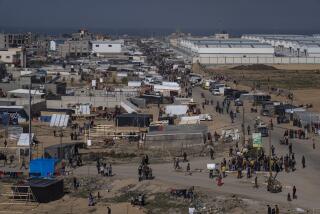35 Journalists Flee to Turkey From Iraq : Civil war: They report growing chaos amid the Kurdish rebellion. Thousands more refugees are expected.
- Share via
ANKARA, Turkey — At least 35 foreign journalists fled the rebellion in Iraq into Turkey, officials and reporters said Tuesday. Most of the reporters had to cross a swift river or hike across rugged mountains, they said.
Turkey’s semiofficial Anatolia News Agency quoted some of the reporters as saying that one journalist had died and two were injured in clashes between Iraqi troops and Kurdish rebels. The journalists’ names were not given, and the report could not be independently confirmed.
The group of journalists arrived late Monday in southeastern Turkey.
Austrian journalist Alex Mokry said he was in a group of journalists who entered Iraq from Syria and spent 11 days covering the fighting between Iraqi Kurds and Saddam Hussein’s troops, who have driven back rebels in many areas.
The reporters decided to flee Iraq “because there was no authority left there (northern Iraq), and we really feared for our lives.”
Gen. Dogan Gures, Turkey’s military commander, said 200,000 refugees are expected to try to enter Turkey after the collapse of the Kurdish rebellion. He said the government has not yet decided whether to admit the refugees.
Another journalist who escaped was Jim Hill of Cable News Network, who said he was with 17 journalists, some of whom reached Turkey by swimming across the Hezil River on the border. He said Turkish soldiers began firing at them as they swam toward the Turkish shore, with bullets hitting the water nearby.
The group reached the Turkish side and identified themselves to Turkish officers, Hill said in a live broadcast Tuesday.
Other journalists walked through mountain areas in the Silopi township region, Anatolia reported.
Among the U.S. reporters who reached Turkey was Charles Glass of ABC, Geraldine Brooks of the Wall Street Journal, Jonathan Randal of the Washington Post and Martin Nangle, a photographer for the Associated Press.
Meanwhile, the Iraqi state press said Tuesday that only a few more days will be needed to stamp out fighting with Kurdish rebels, who reported renewed skirmishes around the strategic oil center of Kirkuk.
The collapse of Kurdish resistance in major cities such as Irbil, Dahuk and Zakhu indicated the rebellion was crumbling throughout the northern region and “they know their inevitable end is near,” the official Iraqi News Agency quoted the newspaper of the ruling Arab Baath Socialist Party as saying.
The office for the Patriotic Union of Kurdistan in the Syrian capital of Damascus, Syria, said the Kurdish rebels have retaken control of the road linking Irbil and Kirkuk, lost last Friday, and have advanced on the city’s suburbs after a heavy battle.
It said reports that rebels had retaken Kirkuk were unfounded.
At the United Nations in New York, the Security Council was poised to pass a sweeping resolution setting tough cease-fire terms for Iraq. Its provisions included requiring Iraq to scrap all its Scud-type missiles capable of hitting Israel.
Secretary General Javier Perez de Cuellar said he is “gravely concerned about reports of heavy fighting and bloodshed in both northern and southern Iraq” and urged Hussein’s government to halt its campaign against the rebels.
More to Read
Sign up for Essential California
The most important California stories and recommendations in your inbox every morning.
You may occasionally receive promotional content from the Los Angeles Times.













